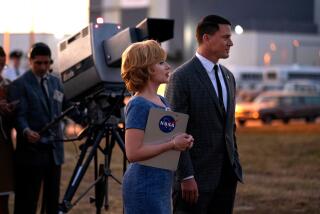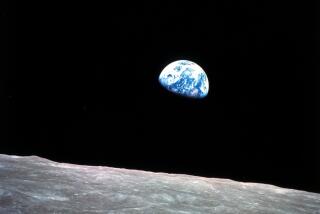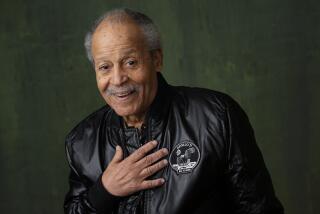He Was One Cool Moonwalker and Full of Surprises
- Share via
Now that we’ve lost Alan Shepard, I can’t help feeling that something is wrong with this picture; astronauts aren’t supposed to grow old and leave this Earth forever. In our memories they remain as Shepard was on that sunny Friday morning in May 1961 when he lay inside a tiny Mercury capsule ready to be hurled into space atop a Redstone booster.
No matter what the skeptics thought, this was no crazy stunt; it was nothing less than a crucial battle in the Cold War. Already the Russians had scored two key victories with the first artificial satellite and the first person in space. Everyone, from the NASA engineers preparing to fire Shepard into the heavens to the millions watching on live television, knew what was at stake. They also knew the risks. With images of exploding rockets fresh in the national consciousness, Shepard’s flight seemed incredibly dangerous. Some doctors worried that the astronaut might not survive the stresses of launch and reentry. But as Shepard waited for technicians to resolve a last-minute technical problem, he grew impatient. The words he spoke over the radio were the stuff of folklore: “I’m cooler than you are. Why don’t you fix your little problem and light this candle?”
Then came the 15 glorious minutes that transformed Shepard into the nation’s first space traveler. After a flawless suborbital flight, he returned to a nation overjoyed at its long-awaited space victory. President Kennedy witnessed the reaction, and three weeks later he challenged that nation to put a man on the moon before the end of the decade. Shepard’s flight had helped launch the greatest exploration of the 20th century.
This is the Alan Shepard the world saw. Far fewer people witnessed the cruel change in fortune that came two years later as Shepard confronted the worst word a pilot can hear: grounded. Stricken with an inner-ear disorder that upset his equilibrium, Shepard was forbidden to fly an airplane by himself or in space at all. He took on the role of chief astronaut, presiding over a collection of egos that were like a football team made up entirely of star quarterbacks.
The other astronauts called him “Big Al”; few called him a friend. Shepard’s secretary kept on her desk a cube decorated with various faces--a smile, a scowl and so on. She would display whichever face matched her boss’s mood that day. On seeing the cube, other astronauts could decide whether to face his icy stare or make an evasive maneuver.
In an ironic twist, this grounded astronaut helped select the crews for each space mission. Time after time, he rode with them to the launch pad only to stay behind as they thundered into space. At the same time, Shepard applied his energies to a host of business ventures that made him a wealthy man. The astronauts wryly dubbed him the star of “How to Succeed in Business Without Really Flying Very Much.” But they knew without his telling them that these earthbound successes paled before Shepard’s longing to prove himself once more by returning to space.
Shepard’s only hope for that came in 1968, when he underwent a risky operation to correct his inner-ear condition. The gamble paid off; the following spring he was returned to flight status, just in time for the climax of the moon race. With characteristic self-confidence, he recommended himself for command of the next available Apollo mission, Apollo 13. But NASA Headquarters wouldn’t approve the assignment, saying Shepard needed more time to train--a claim Shepard denied. Because of this, however, Shepard missed being on the ill-fated mission that nearly cost the lives of Jim Lovell and his crew.
At the ripe old age of 47--making him the oldest American at that time in space--Shepard took command of Apollo 14, the first mission to land in the lunar highlands. Science aside, many observers felt that after the near-disaster of Apollo 13, the future of the U.S. space program rested with Shepard’s crew. Once again, Shepard had become the man of the hour.
On Feb. 5, 1971, Shepard and co-pilot Ed Mitchell descended to the moon’s Fra Mauro highlands and touched down closer to their target than any other landing in the Apollo program. And though Shepard and Mitchell gathered valuable scientific data during their two moonwalks, the moment best remembered from the flight came when Shepard stood before the TV camera and announced, “In my left hand, I hold a genuine six iron. In my right hand, I hold a white pellet that’s familiar to millions of Americans.”
The idea of hitting a golf ball on the moon had come to Shepard one day during training when Bob Hope came to visit the space center, clutching his trademark golf club. Hope held onto that golf club even when he was trying out a moonwalk simulator, and Shepard--himself an avid golfer--told himself, “There’s got to be a way.” Standing on the moon, Shepard managed to connect with the ball--hindered somewhat by the stiffness of his pressurized space suit--and as he watched it sail away, he announced, “Miles and miles!” The first lunar golf shot is almost as well-remembered as Armstrong and Aldrin’s first steps on the moon.
When I first met with Shepard in the fall of 1988, I wasn’t sure what to expect. I’d heard some astronauts describe a self-confidence that spilled over into arrogance. I’d heard one or two others say that Shepard could be utterly charming--when he wanted to be. Still others simply said, “Shepard is just Shepard.”
In the end I recognized each version of Alan Shepard, but I also found him gracious and happy to reflect on his remarkable life. He confessed to feeling amazement and awe at seeing the moon come up at night and realizing that he had walked there. And he described the moment when he had gazed up from that ancient, alien ground at the sight of the Earth, hanging like a blue-and-white marble in the blackness of space. The sight had so overwhelmed him, Shepard said, that he cried for several long moments.
No revelation about himself could have been more surprising; in that story, I sensed the depth of this complex man.
Unlike some of his fellow moonwalkers, Shepard readily admitted having been changed by the experience. “Before I went to the moon,” he once remarked, “I was a rotten SOB. Now I’m just an SOB.” He elaborated to me that the chance to prove himself, to show what he was made of, had made him “a little more human, maybe.”
Now, when I recall those visits, I remember Shepard’s larger than life physical presence, and I remember what he said when I asked him why he had wanted to make a lunar voyage. It wasn’t the moon, per se, that had been the lure; his motivation had been the same as lies at the heart of any pioneer.
“I’ve always tried to push the frontier,” he said, “and it’s nice that the moon happened to get in the way.”
Andrew Chaikin is the author of “A Man on the Moon: The Triumphant Story of the Apollo Space Program” (Penguin, 1998). The recent HBO miniseries, “From the Earth to the Moon,” produced by Tom Hanks, was based in part on his book.
More to Read
Sign up for Essential California
The most important California stories and recommendations in your inbox every morning.
You may occasionally receive promotional content from the Los Angeles Times.













